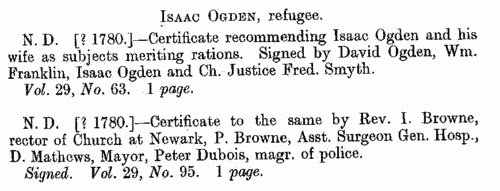Add this eBook to your basket to receive access to all 56 records. Our indexes include entries for the spelling aberdein. In the period you have requested, we have the following 56 records (displaying 1 to 10): These sample scans are from the original record. You will get scans of the full pages or articles where the surname you searched for has been found. Your web browser may prevent the sample windows from opening; in this case please change your browser settings to allow pop-up windows from this site.  Masters of Apprentices registered at Edinburgh
(1717-1719) Masters of Apprentices registered at Edinburgh
(1717-1719)
Apprenticeship indentures and clerks' articles were subject to a 6d or 12d per pound stamp duty: the registers of the payments usually give the master's trade, address, and occupation, and the apprentice's father's name and address, as well as details of the date and length of the apprenticeship. There are central registers for collections of the stamp duty in London, as well as returns from collectors in the provinces. There was a single collection for the whole of Scotland, made in Edinburgh. The sums collected are recorded in Scottish money, with conversion to sterling for transfer to London. A Scottish pund was worth 20 English pence. Because of the delay before some collectors made their returns, this register includes indentures and articles from as early as 1716. (The sample entry shown on this scan is taken from a Norfolk return) | Sample scan, click to enlarge

|  Apprentices registered in Scotland
(1741-1745) Apprentices registered in Scotland
(1741-1745)
Apprenticeship indentures and clerks' articles were subject to a 6d or 12d per pound stamp duty: the registers of the payments usually give the master's trade, address, and occupation, and the apprentice's father's name and address, as well as details of the date and length of the apprenticeship. There are central registers for collections of the stamp duty in London, as well as returns from collectors in the provinces and from Scotland. The sums collected are recorded in Scottish money, with conversion to sterling for transfer to London. A Scottish pund was worth 20 English pence. (The sample entry shown on this scan is taken from a Norfolk return) | Sample scan, click to enlarge

|  Masters of Apprentices
(1766) Masters of Apprentices
(1766)
Apprenticeship indentures and clerks' articles were subject to a 6d or 12d per pound stamp duty (late payment of the 6d rate attracted double duty (D D) of 12d): the registers of the payments usually give the master's trade, address, and occupation, and the apprentice's name, as well as details of the date and length of the apprenticeship. 6 July to 31 December 1766. | Sample scan, click to enlarge

|  Apprentices
(1769) Apprentices
(1769)
Apprenticeship indentures and clerks' articles were subject to a 6d or 12d per pound stamp duty (late payment of the 6d rate attracted double duty (D D) of 12d): the registers of the payments usually give the master's trade, address, and occupation, and the apprentice's name, as well as details of the date and length of the apprenticeship. 2 January to 31 December 1769. | Sample scan, click to enlarge

|  Masters of Apprentices
(1771) Masters of Apprentices
(1771)
Apprenticeship indentures and clerks' articles were subject to a 6d or 12d per pound stamp duty (late payment of the 6d rate attracted double duty (D D) of 12d): the registers of the payments usually give the master's trade, address, and occupation, and the apprentice's name, as well as details of the date and length of the apprenticeship. 18 March to 31 December 1771 | Sample scan, click to enlarge

|  Masters of clerks and apprentices
(1775) Masters of clerks and apprentices
(1775)
Apprenticeship indentures and clerks' articles were subject to a 6d or 12d per pound stamp duty: the registers of the payments usually give the master's trade, address, and occupation, and the apprentice's name, as well as details of the date and length of the apprenticeship. 1 January to 31 December 1775. | Sample scan, click to enlarge

| Deaths, Marriages, News and Promotions
(1776)
Death notices and obituaries, marriage and birth notices, civil and military promotions, clerical preferments, and bankrupts, as reported in the Gentleman's Magazine. Mostly from England and Wales, but items from Ireland, Scotland and abroad.
| Sample scan, click to enlarge

| Subscribers to the Racing Calendar: London and Middlesex
(1777)
The extensive subscription list for 1777 to the annual Racing Calendar first gives the names of the nobility, then the other subscribers county by county for England, with separate sections for Wales, Ireland and Scotland. Initials or christian names are stated only occasionally. | Sample scan, click to enlarge

| Deaths, Marriages, News and Promotions
(1778)
Death notices and obituaries, marriage and birth notices, civil and military promotions, clerical preferments, and bankrupts, as reported in the Gentleman's Magazine. Mostly from England and Wales, but items from Ireland, Scotland and abroad.
| Sample scan, click to enlarge

| Soldiers, administrators, refugees and merchants in America
(1779-1782)
These are the headquarters papers of sir Henry Clinton, British commander-in-chief during the American war of independence. Many of the individuals recorded were part of the British military administration, but others are refugees and merchants whose lives had been disrupted by the conflict. These records are from August 1779 to June 1782. | Sample scan, click to enlarge

|
Research your ancestry, family history, genealogy and one-name study by direct access to original records and archives indexed by surname.
|












